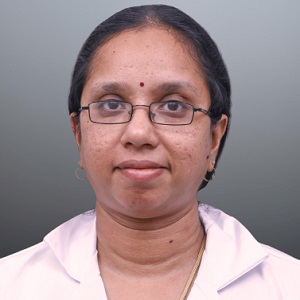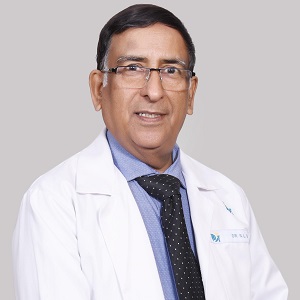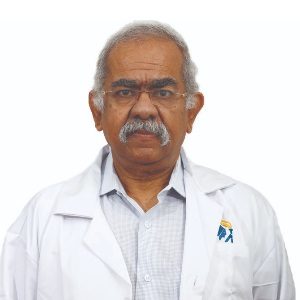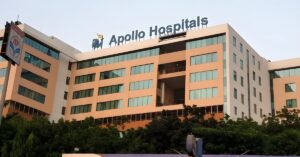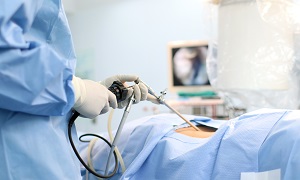Best Appendicitis Treatment Doctors in India
- Top Gastroenterologist & Hepatologist | Apollo Hospital, New Delhi, India
- 30+ Years Experience
- Indraprastha Apollo Hospital, New Delhi
Profile Highlights:
- Dr. Amitabha Dutta is a highly esteemed Gastroenterology and GI Medicine Specialist with over 30 years of distinguished experience in his field.
- He practices at Apollo Hospitals Indraprastha in New Delhi, where he offers expert care in diagnosing and treating a wide range of gastrointestinal conditions.
- He further advanced his qualifications with prestigious fellowships, earning FRCP from The Royal College of Physicians of Ireland in 2014 and FRCP from the Royal College of Physicians, London in 2015
- Gastroenterologist, Chennai, India
- Over 13 years’ experience
- Apollo Clinic Valasaravakkam; Chennai
Profile Highlights:
- Dr. M Tarakeshwari is a well-known gastroenterologist who provides various services to her patients and is an expert in cytokines in IBS, treating Hepatitis B in pregnancy as well as renal failure in Cirrhosis.
- Some of the services provided by the Dr. M Tarakeshwari are: Acidity Treatment, Gallbladder (Biliary) Stone Treatment, Bladder Cancer Surgery, Inflammatory Bowel Disease (IBD) Treatment Ulcerative Colitis Treatment, etc
- Top Medical Gastroenterologist | Apollo Hospital, New Delhi, India
- 54+ Years Experience
- Indraprastha Apollo Hospital, New Delhi
Profile Highlights:
- Dr. Sohan Lal Broor is a Gastroenterologist and has an experience of 54 years in this field. Dr. Broor practices at Indraprastha Apollo Hospitals in New Delhi.
- He completed MBBS from Panjab University in 1967, MD – Medicine from PGIMER, Chandigarh in 1972, and DM – Gastroenterology from PGIMER, Chandigarh in 1974.
- Dr. Sohan Lal Broor is a member of the 2-Year Fellowship in Gastroenterology at Medical College Of Wisconsin, Milwaukee, USA.
- Some of the services provided by Dr. Broor are Irritable Bowel Syndrome ( IBS ) Treatment, Peptic/ Gastric Ulcer Treatment, Inflammatory Bowel Disease (IBD) Treatment, Hemorrhoids Treatment, and Gastritis Treatment.
- Gastroenterologist and GI Medicine Specialist, Chennai, India
- Over 23 years’ experience
- Apollo Hospitals Greams Road
Profile Highlights:
- Dr. Revathy Shanmugam is an experienced Gastroenterologist in Tamil Nadu, having an experience of 23 years in the management of GI disorders, Training & Teaching.
- She is highly skilled in the services like Liver Disease Treatment and Inflammatory Bowel Disease (IBD) Treatment.
- She has published various scholarly works in many National & International Publications of Medical Gastroenterology.
- Gastroenterologist and GI Medicine Specialist, Chennai, India
- Over 32 years’ experience
- Apollo Hospitals Greams Road
Profile Highlights:
- Dr. Hariharan Muthuswamy is a veteran Gastroenterologist and Hepatologist in India with over 32 years of experience.
- He is currently a Senior Consultant in Gastroenterology at Apollo Hospital, Chennai.
- Dr. Muthuswamy is proficient in treating patients with Non-Surgical Piles, Liver Disease, Hepatitis E, Hepatitis A and Hepatitis B, Hemorrhoids, Acid Reflux (Heartburn), Amoebiasis, Chronic Pancreatitis, Peptic Ulcers (Sores in the Stomach Lining), etc.
- Gastroenterologist and GI Medicine Specialist, Chennai, India
- Over 32 years’ experience
- Apollo Hospitals Greams Road
Profile Highlights:
- Dr. Mohan A T is a veteran GI medicine specialist in India with an experience of 32 years.
- Dr. Mohan, an alumnus of Madras University, is the Co-Ordinator of the Indian Society of Enteral and Parenteral Nutrition.
- He is an expert in treating Gastritis, acidity, Ulcerative Colitis, and many other Intestinal and bowel-related Treatments. In addition to these, he offers Colonoscopy, Gastroscopy, and Endoscopy.
- Gastroenterologist and GI Medicine Specialist, Chennai, India
- Over 15 years’ experience
- Apollo Hospitals Greams Road
Profile Highlights:
- Dr. Piramanayagam P is one of the young Gastroenterologists in India, having an experience of 15 years in the field.
- The doctor offer services like Gall Bladder (Biliary) Stone treatment, IBS treatment, Acidity Treatment, Endoscopy, and stomach and intestine dysfunction.
- He published many review articles and books under his name.
- Gastroenterologist and GI Medicine Specialist, Chennai, India
- Over 39 years’ experience
- Apollo Hospitals Greams Road
Profile Highlights:
- Dr. Sarojini Parameswaran is one of the renowned Gastroenterologist with an overall experience of 39 years.
- Dr. Parameswaran is brilliant and quick with diagnosis. She has 22 years of specialist experience.
- Gastroenterologist and GI Medicine Specialist, Chennai, India
- Over 24 years’ experience
- Apollo Hospitals Greams Road
Profile Highlights:
- Dr. Seshadri Venkatesh P is a well-known Gastroenterologist in India, having 24 years of experience in Stomach and Intestine disorders.
- Dr. Seshadri acquired proficiency in managing Bladder Cancer surgery, hemorrhoids, Irritable Bowel Syndrome (IBS) Treatment, etc.
- He holds membership in Tamil Nadu Medical Council.
- Gastroenterologist and GI Medicine Specialist, Chennai, India
- Over 40 years’ experience
- Apollo Hospitals Greams Road
Profile Highlights:
- Dr. Usha Srinivas is a Gastroenterologist in India with an experience of 40+ years in GI in medicine and academics.
- Patients visit her for consultation and treatment of abdominal pain, Gall Bladder (Biliary) Stone, Gastroenteritis, Jaundice, Colonoscopy, Steatosis, Constipation Treatment, Hepatitis C Treatment, Hepatitis E Treatment, Hemorrhoids Treatment, Piles Treatment (Non-Surgical), Gastritis Treatment, Ulcerative Colitis Treatment, and others.
Best Appendicitis Treatment Hospitals in India.
- City: New Delhi, India
Hospital Highlights:
- Equipped with 650 beds, BLK-Max Super Speciality Hospital is the largest stand-alone private sector hospital in Delhi.
- With over 1500 healthcare providers and 150 globally renowned super specialists, the hospital is one of Asia’s largest BMT Centres. The hospital is known for having some of the best cancer doctors in the country.
- The hospital is NABH and NABL accredited and was inaugurated by the first Prime Minister of India. Pt. Jawahar Lal Nehru.
- City: Hyderabad, India
Hospital Highlights:
- Located in the vibrant city of Hyderabad, Apollo Health City is a world-renowned medical facility that provides outstanding care and treatment to patients coming from different parts of the world.
- Founded in 1988, this 550-bed multispecialty hospital with 50 specialties and 12 Centres of Excellence continues to deliver outstanding outcomes for patients with the simplest to the most complicated medical conditions.
- Backed by the latest medical equipment and a dedicated team of professionals, the hospital provides comprehensive treatment across various specialties including, cardiology, critical care, neurosciences, cancer, orthopedics, gynecology, ENT, transplants, gastroenterology, etc.
- Apollo Health City is a cutting-edge healthcare facility that combines various facilities under one roof. These may include state-of-the-art physical medicine, rehabilitation, and wellness services with education, research, telemedicine, innovative medical devices, disease management programmes, and medical talents.
- The hospital is known for offering top-notch cancer treatment accompanied by cutting-edge facilities and technology.
- The hospital also offers a broad spectrum of cosmetic procedures that improve not just appearance but also comfort.
- In 2011, Apollo Health City was the recipient of the Asian Hospital Management Award (AHMA).
- In 2013, the Government of India recognized Apollo Health City as the top medical tourism destination in the country.
- City: Mumbai, India
Hospital Highlights:
- Kokilaben Dhirubhai Ambani Hospital, Named after the wife of Indian industrialist Dhirubhai Ambani, the founder of Reliance Industries, this is one of the top hospitals in Mumbai. This 750-bed multi-specialty hospital became operational in 2009. Known as one of India’s most advanced tertiary care facilities, the hospital is designed to raise India’s global standing as a healthcare hub, with an emphasis on excellence in clinical services.
- Kokilaben Dhirubhai Ambani Hospital uses Protocol and Care Pathway based treatment models to ensure the best outcomes for patients.
- The hospital represents a confluence of top-notch talent, cutting-edge technology, state-of-the-art infrastructure, and, most importantly commitment.
- The hospital also holds the accreditation of the NABH, NABL, CAP, and JCI.
- The hospital has been recognized as the No. 1 Multispecialty Hospital in Mumbai and the West Zone for the fifth year in a row in 2020 by The Week.
- City: Chennai, India
Hospital Highlights:
- Apollo Cancer Centre in Teynampet, Chennai is one of the best super speciality hospitals in India. It is the country’s first ISO-certified healthcare facility.
- Additionally, it is the first hospital in Chennai and the first oncology hospital in India to receive NABH accreditation.
- The hospital provides advanced tertiary care in oncology, orthopedics, neurology and neurosurgery, head and neck surgery, and reconstructive and plastic surgery.
- Additionally, it offers specialized healthcare of international standards with results comparable to those of the best hospitals in the world.
- It is outfitted with 300 beds, the newest and greatest technology, a large pool of highly qualified specialists, and a committed team of medical and paramedical professionals.
- It is one of the first few medical facilities in India to offer comprehensive cancer care. A team of skilled medical, surgical, and radiation oncologists makes up the Tumour Board, which is a component of the complete treatment planning system. After reviewing reported cases, the Board determines in concert with diagnostic specialists what course of action is best for each individual patient. The panel is further supported by dieticians, medical counselors, speech therapists, and other pertinent specialists.
- The hospital launched the first ExcelsiusGPS® Spine Robot in South India and has completed over 50 surgeries till date.
- It is also one of the few cancer hospitals in India to offer Cyber Knife therapy. Till now it has completed 1320 Cyber Knife therapies.
- The institution is also one of the few in India with the capacity to do transplants and find a prospective unrelated donor. The hospital has performed over 1000 BMTs till now.
- Furthermore, it has an exceptional milestone of performing exultant Micro vascular free tissue transfer and Aesthetic surgeries on more than 1000 patients with success.
- City: Chennai, India
Hospital Highlights:
- Apollo Hospitals, Chennai, is one of the best hospitals for heart care in India. Over the years, Apollo has expanded all over India, as a healthcare chain.
- India’s first ‘Only Pancreas’ transplant was performed in Apollo Hospital. The hospital is known for successfully performing Asia’s first en-bloc combined heart and liver transplant, and over the years, it has attained a remarkable achievement in the global healthcare space. Around 3-4 organ transplants are performed in the hospital per day.
- Equipped with over 500 beds, this hospital in Chennai was established in 1983 and since then has been among the most preferred hospital for patients from all over the world.
- The hospital holds accreditation of the NABH and JCI and is the first hospital in India to be ISO 9001 and ISO 14001 certified. It is also the first South Indian Hospital to receive subsequent reaccreditation from the JCI USA 4 times.
- City: Chennai, India
Hospital Highlights:
- Established in 1999, Gleneagles Global Hospital, Chennai, is one of the top healthcare facilities in Southern India. It is part of the Gleneagles Hospital Chain, which is the fourth largest healthcare chain in the country. The hospital specializes in multi-organ transplants of kidneys, liver, lungs, heart, etc.
- The hospital has an excellent infrastructure and state-of-the-art lab and equipment set-up. The hospital boasts cutting-edge technologies, a highly skilled team of doctors and surgeons, and trained support staff. Located in Perumbakam, Chennai, it is one of India’s premier health care destinations. The hospital has performed some of the most complex surgical and clinical procedures in India including multi-organ transplantations.
- The hospital’s lung transplantation program is one of the best in the country. The hospital is known for having performed India’s first single lung transplant and first minimal invasive lung transplant. It is also the only Indian hospital to be associated with King’s College Hospital, London, United Kingdom for liver transplantations.
- City: Hyderabad, India
Hospital Highlights:
- KIMS Hospital (a brand name of Krishna Institute of Medical Sciences) is one of the largest and best multi-speciality hospitals in Hyderabad. The hospital provides various treatments to an enormous number of patients.
- The hospital has a capacity of more than 3000 beds. KIMS Hospitals offers different healthcare services in more than 25 specialities and super specialities.
- The hospital is equipped with modern medical equipment and technology. It has robotic equipment to provide minimal invasive techniques for patients.
- The hospital is aimed at providing world-class healthcare facilities and services at an affordable cost for patients.
- The various specialities and departments of the hospital include neurosciences, gastroenterology & hepatology, robotic science, reproductive sciences, dental science, oncological sciences, organ transplantation, heart and lung transplantation and mother and child care.
- City: Kolkata, India
Hospital Highlights:
- Established in 2003, Apollo Gleneagles Hospitals is a 750-bed multispecialty tertiary care hospital situated in Kolkata.
- With 33 Centres of Excellence and more than 50 specialties, Apollo Gleneagles Hospitals, Kolkata is capable of handling all sorts of patients.
- This tertiary care hospital, which is a 100% subsidiary of Apollo Hospitals Enterprise Ltd., India, is regarded as one of Kolkata’s top hospitals.
- The facility is a complete blend of cutting-edge technology, state-of-the-art infrastructure, and genuine hospitality.
- Focusing on numerous specialties, the hospital provides all-inclusive medical treatments supported by cutting-edge technology and a staff of highly qualified medical specialists.
- Patients across the globe come to Apollo Gleneagles Hospitals Kolkata for their treatment. Moreover, international patients receive full attention and assistance for their treatment and are provided with a hassle free experience.
- Apollo Gleneagles Hospitals, Kolkata is the only hospital in Eastern India to hold the Joint Commission International (JCI) certificate.
- It is also the only hospital in Kolkata to hold the NABL accreditation in six different categories, which includes Clinical Biochemistry, Clinical Pathology, Hematology & Immunohematology, Microbiology & Serology, and Histopathology & Cytopathology.
- Furthermore, Apollo Gleneagles Hospitals, Kolkata is known for performing the first ever Reverse Shoulder Prosthesis Replacement in East India.
- City: Bengaluru, India
Hospital Highlights:
- Established in 1991, Manipal Hospital, Old Airport Road, Bangalore is the flagship facility of the Manipal Hospitals Group, which is one of the largest networks of Multispecialty Private Hospitals in India.
- The facility is well-known for its state-of-the-art technology, performance-driven, patient-centric, and evidence-based approach.
- The facilities offered at Manipal Hospital meet the highest international standards, allowing the hospital to attract a large number of national and international patients.
- Their expertise encompasses the diagnosis and treatment of a wide range of diseases in several specializations that address both simple as well as complex medical procedures.
- There are total 600 beds accessible in the hospital for the in-patients so they may heal while being closely watched after by the medical team. In addition, it has 144 critical care units, including NICUs, ICCUs, and ICUs. Apart from that, the hospital also offers 20 contemporary, modular state-of-the-art operating rooms with all the amenities needed.
- The hospital has several departments that are overseen by highly skilled, certified, and experienced medical experts.
- One of the best departments in the hospital is that of the Cancer department which is known for its advanced cancer diagnosis and treatment facilities such as Intracavitary Chemotherapy, Biological Therapy, HIPEC, PIPEC, Nuclear Medicine, Radiation Therapy, etc.
- It is one of the few hospitals in Bangalore that provides full range of pediatric services, including pediatric emergency services, pediatric gastroenterology, pediatric neurology, pediatric cardiology, pediatric orthopaedics, pediatric allergies, pediatric immunology, and infectious diseases.
- Furthermore, Manipal Hospital, Old Airport Road, Bangalore is also regarded as one of the best hospitals for bone and spine related disorders.
- City: Mumbai, India
Hospital Highlights:
- Established in 2016, Apollo Hospitals, Navi Mumbai is one of Maharashtra’s most advanced multispecialty hospital. This 500-bed hospital provides sophisticated treatments and integrated super specialty services under one roof.
- The hospital features a cutting-edge infrastructure that houses 13 state-of-the-art operating rooms, advanced laboratory and medical diagnostics, and 120 ultra-modern I.C.U. beds, including N.I.C.U. and P.I.C.U., monitored round the clock by critical care specialists.
- With 57 specialties and subspecialties, the hospital boasts a team of renowned medical specialists who offer accurate diagnosis and treatment with easy accessibility to their patients.
- Additionally, the hospital offers highly customized, individualized health check programs that are made to fit each person’s needs in terms of lifestyle.
- Apollo Hospitals, Navi Mumbai has been accredited by both the National Accreditation Board for Hospitals and Healthcare Providers (NABH) and the Joint Commission International (JCI).
- Apollo Hospitals Navi Mumbai has been awarded the “Best Practices-International Services Award” at the annual awards for service excellence and operations excellence.
What is Appendicitis?
Appendicitis is a medical condition in which there is an inflammation of the Appendix. The Appendix is a finger-shaped pouch that projects from the colon on the right side of our abdomen.
Patients with appendicitis experience pain in lower abdomen. The pain generally begins around the navel and progresses. The pain becomes intense as the inflammation worsens.
Appendicitis generally occurs in the age group 10-30, but can happen at other ages also.
Types of Appendicitis
The two common types of Appendicitis are:
- Acute Appendicitis – Acute Appendicitis appears suddenly and can be severe in nature. Acute appendicitis requires instant/ immediate medical attention and is actually more common than chronic appendicitis
- Chronic Appendicitis – In Chronic Appendicitis, the symptoms are mild and progressive in nature and may come and go from time to time. This type of appendicitis can be hard to diagnose and may only be detected if it turns into acute appendicitis.
Possible complications of untreated Appendicitis
An untreated appendicitis is much more dangerous as it can burst and cause a nasty bacterial spill in your gut and larger intestine which is actually quite dangerous.
But hopefully, you don’t have to wait around waiting for your appendix to rupture, especially if you know everything about the common appendicitis symptoms and most importantly the cause.
Causes of Appendicitis
Although we are yet to determine the exact cause of appendicitis, here’s what doctors and medical practitioners have narrowed down the most probable causes leading to this condition.
Appendicitis primarily develops when a part of the appendix gets blocked or obstructed by any object inside the body. The object can be anything from-
● Intestinal worms
● Hardened stool
● Physical trauma
● Certain foreign body
● Cancer (Rare but possible)
Symptoms of Appendicitis
The most common appendicitis symptoms would include:
- Pain in the navel region (above or below)
- Pain in the lower right abdominal area
- Recurring indigestion
- Nausea (maybe accompanied by vomiting)
- Appetite loss
- Diarrhea / constipation
- Bloating or abdominal swelling
- Mild fever
Appendicitis pain starts off mild much like cramps but would eventually grow more and more intense with time. Also, the initial source of the pain keeps changing with time moving from the upper abdomen to the lower right section of your abdomen.
Diagnosis of Appendicitis
Following are some of the diagnostic tests for Appendicitis.
- CT scan / MRI / X-Ray
- Ultrasound
- Complete Blood Count or CBC Test
- Urine test (to determine presence of infection)
- Rectal test
- Physical exams (to access pain, inflammation, discomfort level)
Appendicitis Treatment
Based on your age, severity, and other variables; you doctor may suggest some non-invasive treatment methods such as- antibiotics, pain relievers, liquid diet etc.
However, in most of the appendicitis cases, a surgery is the best option for a complete cure and the surgery most commonly practiced for it is known as Appendectomy. This standard form of treatment eliminates not just the inflamed organ but probable safety hazard risks such as appendix rupture too.
Appendicitis Surgery
The two primary invasive treatment methods thus include:
Appendectomy
Appendectomy is an open surgery where a small incision is made to surgically remove the inflamed appendix. However, laparoscopic surgery options are becoming more and more common these days where small surgical tools are inserted along with a minute video camera to surgically remove the appendix. The recovery time for this procedure is usually fast with almost 90% success rate.
Abscess Drainage
Appendicitis Surgery- things you need to remember
- If your medical practitioner recommends surgical intervention, please disclose your full medical history (along with existing or current medication routine) before the surgery.
- Your doctor may request you to follow a certain diet which may include liquids, no alcohol, and no tobacco! Please follow the routine strictly as it can increase the success rate of your surgery.
- You can be back on your feet within 12 hrs of this surgery (provided there are no additional complications)
- If you experience symptoms like nausea, intense stomach /abdominal pain, high fever, bloody vomit, wound infection from the surgery- please contact your doctor immediately
Appendicitis post recovery care
For the next few weeks after your appendicitis surgery, here are some of the basic lifestyle steps you should take to ensure a speedy recovery:
- Don’t live a sedentary lifestyle but don’t go overboard with your activities. Start slow and slowly increase
- Provide support to your abdomen if you’re coughing. You can press a pillow over the abdomen and apply mild compression for support before you cough.
- Your doctor may prescribe some low dose pain medication to you. If your pain relievers fail to alleviate pain, please contact your doctor.
- Discuss going back to work or normal lifestyle and the type of help or assistance you would need with your healthcare professional.
Possible complications
Following are the possible complications of an untreated appendicitis:
- Internal Rupture – In case of prolonged ignorance or deliberate ignorance; as mentioned before, a rupture in the appendix can turn this condition from mild/serious to life-threatening!
- Abscess – Appendix bursts or ruptures can also lead to formation of a pus pocket inside the organ, commonly known as an Abscess. Surgeons have to manually drain the abscess in this case and a tube is left inside for about two weeks while you’re prescribed antibiotics to avoid infection.
Prevention is Better Than Cure
Following are the commonly recommended activities & food to avoid having a Appendicitis:
- Include well-cooked vegetables and fresh fruits in your diet
- Legumes and greens are great to keep indigestion and stool complications at bay
- Whole grains are also good for your everyday diet
- Don’t go overboard with anything. Everything appropriately measured and consumed can keep complications like this at bay.
- Sedentary lifestyle is a strict No-No.
FAQs
1. Can appendicitis risk depend on your age?
Yes! Appendicitis risks may vary based on age, sex (men are more likely to get affected than females), and dietary choices based on age groups.
2. How long do I have to wait before I can go back to my normal life?
3. Do I have to stay overnight in the hospital after appendicitis?
4. Do appendicitis run in the family?
Even though we are not sure if its hereditary-based or not, studies have shown, people with a family history of appendicitis are much prone to this condition.


